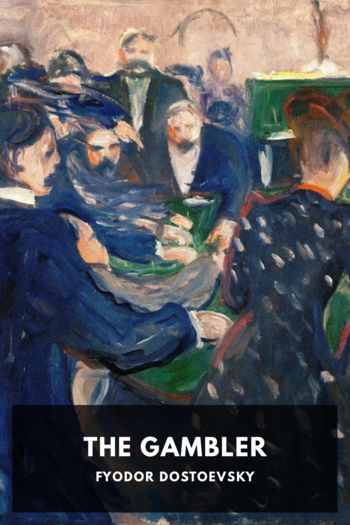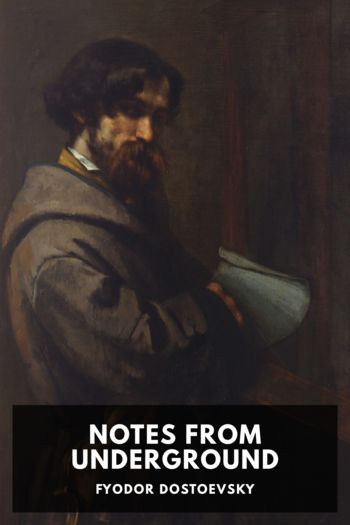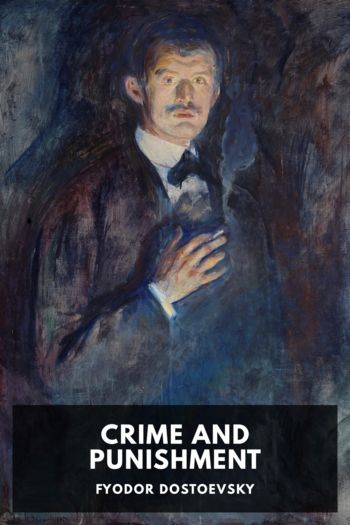The Brothers Karamazov by Fyodor Dostoevsky (i love reading books .txt) 📕

- Author: Fyodor Dostoevsky
Book online «The Brothers Karamazov by Fyodor Dostoevsky (i love reading books .txt) 📕». Author Fyodor Dostoevsky
He was that sort of jealous man who, in the absence of the beloved woman, at once invents all sorts of awful fancies of what may be happening to her, and how she may be betraying him, but, when shaken, heartbroken, convinced of her faithlessness, he runs back to her; at the first glance at her face, her gay, laughing, affectionate face, he revives at once, lays aside all suspicion and with joyful shame abuses himself for his jealousy.
After leaving Grushenka at the gate he rushed home. Oh, he had so much still to do that day! But a load had been lifted from his heart, anyway.
“Now I must only make haste and find out from Smerdyakov whether anything happened there last night, whether, by any chance, she went to Fyodor Pavlovitch; ough!” floated through his mind.
Before he had time to reach his lodging, jealousy had surged up again in his restless heart.
Jealousy! “Othello was not jealous, he was trustful,” observed Pushkin. And that remark alone is enough to show the deep insight of our great poet. Othello’s soul was shattered and his whole outlook clouded simply because his ideal was destroyed. But Othello did not begin hiding, spying, peeping. He was trustful, on the contrary. He had to be led up, pushed on, excited with great difficulty before he could entertain the idea of deceit. The truly jealous man is not like that. It is impossible to picture to oneself the shame and moral degradation to which the jealous man can descend without a qualm of conscience. And yet it’s not as though the jealous were all vulgar and base souls. On the contrary, a man of lofty feelings, whose love is pure and full of self-sacrifice, may yet hide under tables, bribe the vilest people, and be familiar with the lowest ignominy of spying and eavesdropping.
Othello was incapable of making up his mind to faithlessness—not incapable of forgiving it, but of making up his mind to it—though his soul was as innocent and free from malice as a babe’s. It is not so with the really jealous man. It is hard to imagine what some jealous men can make up their mind to and overlook, and what they can forgive! The jealous are the readiest of all to forgive, and all women know it. The jealous man can forgive extraordinarily quickly (though, of course, after a violent scene), and he is able to forgive infidelity almost conclusively proved, the very kisses and embraces he has seen, if only he can somehow be convinced that it has all been “for the last time,” and that his rival will vanish from that day forward, will depart to the ends of the earth, or that he himself will carry her away somewhere, where that dreaded rival will not get near her. Of course the reconciliation is only for an hour. For, even if the rival did disappear next day, he would invent another one and would be jealous of him. And one might wonder what there was in a love that had to be so watched over, what a love could be worth that needed such strenuous guarding. But that the jealous will never understand. And yet among them are men of noble hearts. It is remarkable, too, that those very men of noble hearts, standing hidden in some cupboard, listening and spying, never feel the stings of conscience at that moment, anyway, though they understand clearly enough with their “noble hearts” the shameful depths to which they have voluntarily sunk.
At the sight of Grushenka, Mitya’s jealousy vanished, and, for an instant he became trustful and generous, and positively despised himself for his evil feelings. But it only proved that, in his love for the woman, there was an element of something far higher than he himself imagined, that it was not only a sensual passion, not only the “curve of her body,” of which he had talked to Alyosha. But, as soon as Grushenka had gone, Mitya began to suspect her of all the low cunning of faithlessness, and he felt no sting of conscience at it.
And so jealousy surged up in him again. He had, in any case, to make haste. The first thing to be done was to get hold of at least a small, temporary loan of money. The nine roubles had almost all gone on his expedition. And, as we all know, one can’t take a step without money. But he had thought over in the cart where he could get a loan. He had a brace of fine dueling pistols in a case, which he had not pawned till then because he prized them above all his possessions.
In the “Metropolis” tavern he had some time since made acquaintance with a young official and had learnt that this very opulent bachelor was passionately fond of weapons. He used to buy pistols, revolvers, daggers, hang them on his wall and show them to acquaintances. He prided himself on them, and was quite a specialist on the mechanism of the revolver. Mitya, without stopping to think, went straight to him, and offered to pawn his pistols to him for ten roubles. The official, delighted, began trying to persuade him to sell them outright. But Mitya would not consent, so the young man gave him ten roubles, protesting that nothing would induce him to take interest. They parted friends.
Mitya was in haste; he rushed towards Fyodor Pavlovitch’s by the back way, to his arbor, to get hold of Smerdyakov as soon as possible. In this way the fact was established that three or four hours before a certain event, of which I shall speak later on, Mitya had not a farthing, and pawned for ten roubles a possession he valued, though, three hours later, he was in possession of thousands. … But I am anticipating. From Marya Kondratyevna (the woman living near Fyodor Pavlovitch’s) he learned the very disturbing fact of Smerdyakov’s illness. He heard the story of his





Comments (0)